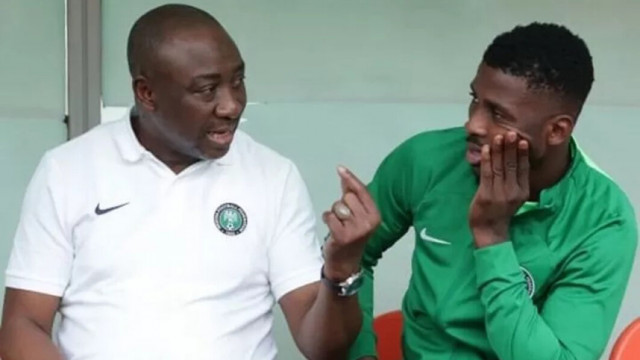A former Green Eagles player now based in the United States, Paul Okoku, has stated that if the Super Eagles do not qualify for the 2026 World Cup, Nigerians should respond in a constructive manner, focusing on analyzing both technical and administrative aspects.
Currently, the Super Eagles are in fourth place in their group with only seven points, and they require divine intervention to secure qualification for the 2026 World Cup, which will be co-hosted by the USA, Canada, and Mexico.
Okoku, who served as the assistant captain of the Flying Eagles in 1983, emphasized in a message to The Guardian the importance of conducting a transparent review of the team’s performance if Nigeria fails to qualify for the tournament.
“The disappointment that followed the Super Eagles' failure to qualify for the last FIFA World Cup in Qatar was deeply felt,” he remarked. “For fans of Nigerian football, the World Cup represents pride, unity, and national achievement. It’s no surprise that when expectations are not met, the backlash is often swift and severe. Typically, the President of the Nigeria Football Federation (NFF) faces significant criticism. However, the future of Nigerian football depends on stability, strategic planning, and continuous development. As supporters assess the direction of the nation’s football, the emphasis should be on building a resilient and competitive Super Eagles, rather than merely seeking a scapegoat.
“If the Super Eagles do not qualify again, the assessment of NFF President Ibrahim Gusau's second term should be based on his overall leadership performance. If he has shown vision, competence, and commitment, a second term for him could be warranted. True leadership involves navigating through failures, making necessary adjustments, and guiding the team toward sustainable success,” he added. Historically, no NFA or NFF president has successfully maintained a second term after the Super Eagles' failure to qualify for the FIFA World Cup.
Nevertheless, Okoku suggested that before calling for Gusau’s resignation or opposing his re-election, it is crucial to adopt a broader perspective: “Leadership is far more than just the outcomes on the field.”
As a philanthropist, Okoku also highlighted that Gusau is neither a player nor a coach. “His main role as NFF President is to provide leadership, ensuring that the national team has the resources, environment, and capable management necessary for success. A key part of this responsibility involves appointing a qualified coach with the tactical skills required to lead the Super Eagles.
“If Gusau has hired a competent coach, allowed them the freedom to choose their assistants, and provided adequate support for the technical team, then he has fulfilled his duties as a leader. At that stage, the accountability rests with the coach and the players. Football is unpredictable – even the best-prepared teams can lose despite adhering to the coach’s strategy.”
According to Okoku, Nigerian football has a worrying trend of reacting to failures by quickly dismissing coaches and demanding the resignation of NFF officials. “Is this strategy effective? Constant managerial changes undermine team unity and morale. Each coach needs time to instill their philosophy, and ongoing disruptions often do more harm than good.
“Instead of resorting to hasty decisions, prioritizing stability and placing trust in the appointed coach may lead to more favorable long-term outcomes. Frequent coaching changes, especially after just two or three matches during qualification, highlight a fundamental flaw in Nigeria’s football management: a lack of continuity. Over recent years, how many coaches have we cycled through? Three or four?
“The relentless turnover is not only alarming but also harmful to the long-term growth of the sport. We often look for immediate outcomes, a ‘firehose’ approach where failure to perform leads to a rapid dismissal. This mindset overlooks the essential truth that achieving lasting success in any field, whether in football or business, necessitates continuity, which nurtures growth, expertise, and stability. Without this foundation, genuine progress becomes unachievable,” Okoku concluded.




















